Hyundai i20 vs Vauxhall Grandland – Which one offers the better deal?
Two cars, one duel: Hyundai i20 meets Vauxhall Grandland.
Which one wins in performance, efficiency and value for money? Find out now!
Here’s where it gets real: The technical differences in detail
Costs and Efficiency: Price and efficiency are key factors when choosing a car – and this is often where the real differences emerge.
Hyundai i20 has a decisively advantage in terms of price – it starts at 17400 £, while the Vauxhall Grandland costs 32600 £. That’s a price difference of around 15162 £.
Fuel consumption also shows a difference: the Vauxhall Grandland manages with 2.60 L and is therefore decisively more efficient than the Hyundai i20 with 5.20 L. The difference is about 2.60 L per 100 km.
Engine and Performance: Under the bonnet, it becomes clear which model is tuned for sportiness and which one takes the lead when you hit the accelerator.
When it comes to engine power, the Vauxhall Grandland has a convincingly edge – offering 325 HP compared to 100 HP. That’s roughly 225 HP more horsepower.
In acceleration from 0 to 100 km/h, the Vauxhall Grandland is clearly quicker – completing the sprint in 6.10 s, while the Hyundai i20 takes 11.10 s. That’s about 5 s faster.
In terms of top speed, the Vauxhall Grandland performs slightly better – reaching 220 km/h, while the Hyundai i20 tops out at 183 km/h. The difference is around 37 km/h.
There’s also a difference in torque: the Vauxhall Grandland pulls clearly stronger with 509 Nm compared to 200 Nm. That’s about 309 Nm difference.
Space and Everyday Use: Whether family car or daily driver – which one offers more room, flexibility and comfort?
Both vehicles offer seating for 5 people.
In curb weight, the Hyundai i20 is convincingly lighter – 1088 kg compared to 1675 kg. The difference is around 587 kg.
In terms of boot space, the Vauxhall Grandland offers noticeable more room – 550 L compared to 352 L. That’s a difference of about 198 L.
In maximum load capacity, the Vauxhall Grandland performs distinct better – up to 1645 L, which is about 480 L more than the Hyundai i20.
When it comes to payload, Vauxhall Grandland to a small extent takes the win – 568 kg compared to 472 kg. That’s a difference of about 96 kg.
All in all, the Vauxhall Grandland shows itself to be leaves the rival little chance and secures the title of DriveDuel Champion.
It impresses with the more balanced overall package and proves to be the more versatile companion for everyday use.
Hyundai i20
The Hyundai i20 impresses with its sleek design and modern aesthetics, making it a stylish choice in the compact car segment. Its interior is thoughtfully designed, offering comfort and advanced technology for a pleasurable driving experience. The vehicle also stands out with its efficient performance and agile handling, making city driving a breeze.
details @ hyundai.news
@ hyundai.news
 @ hyundai.news
@ hyundai.news
 @ hyundai.news
@ hyundai.news
 @ hyundai.news
@ hyundai.news
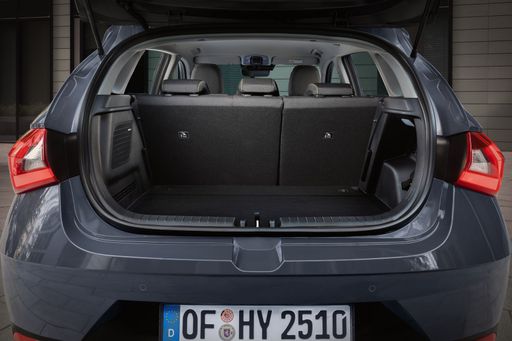 @ hyundai.news
@ hyundai.news
Vauxhall Grandland
The Opel Grandland offers a blend of style and practicality, making it an appealing choice for those seeking a versatile SUV. Its sleek design is complemented by a comfortable and spacious interior, providing an enjoyable driving experience for both short commutes and long journeys. Advanced technology and safety features enhance the overall appeal, ensuring drivers feel confident and connected on the road.
details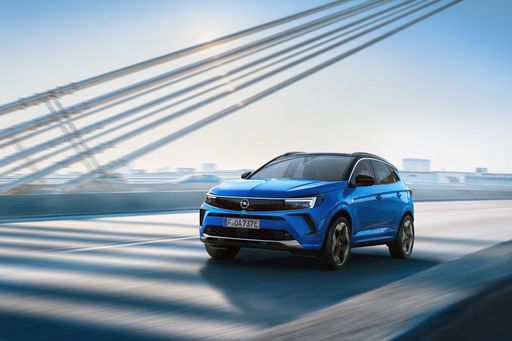 @ media.stellantis.com
@ media.stellantis.com
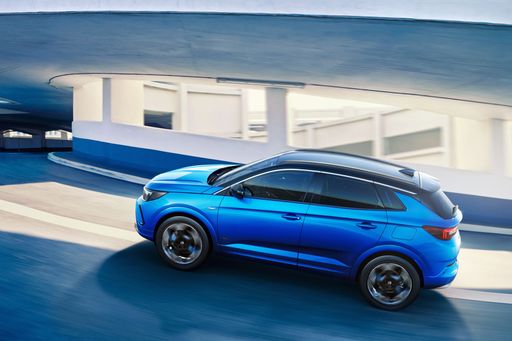 @ media.stellantis.com
@ media.stellantis.com
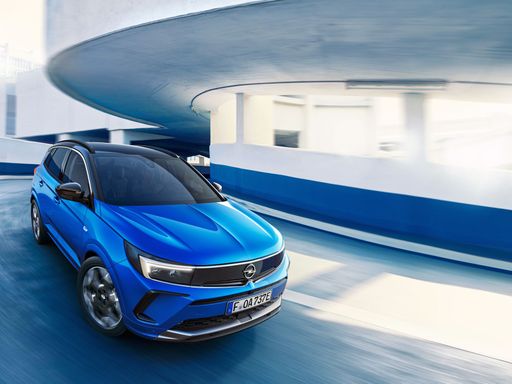 @ media.stellantis.com
@ media.stellantis.com
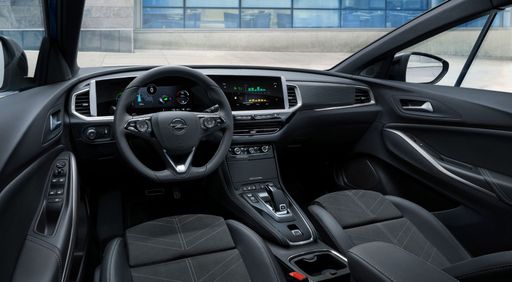 @ media.stellantis.com
@ media.stellantis.com

|

|
|
|
|
Costs and Consumption |
|
|---|---|
|
Price
17400 - 24000 £
|
Price
32600 - 51400 £
|
|
Consumption L/100km
5.2 - 5.3 L
|
Consumption L/100km
2.6 - 5.6 L
|
|
Consumption kWh/100km
-
|
Consumption kWh/100km
16.9 - 18 kWh
|
|
Electric Range
-
|
Electric Range
82 - 523 km
|
|
Battery Capacity
-
|
Battery Capacity
-
|
|
co2
119 - 121 g/km
|
co2
0 - 126 g/km
|
|
Fuel tank capacity
40 L
|
Fuel tank capacity
55 L
|
Dimensions and Body |
|
|---|---|
|
Body Type
Hatchback
|
Body Type
SUV
|
|
Seats
5
|
Seats
5
|
|
Doors
5
|
Doors
5
|
|
Curb weight
1088 - 1190 kg
|
Curb weight
1675 - 2325 kg
|
|
Trunk capacity
352 L
|
Trunk capacity
485 - 550 L
|
|
Length
4065 - 4075 mm
|
Length
4650 mm
|
|
Width
1775 mm
|
Width
1905 - 1934 mm
|
|
Height
1450 - 1455 mm
|
Height
1665 mm
|
|
Max trunk capacity
1165 L
|
Max trunk capacity
1580 - 1645 L
|
|
Payload
450 - 472 kg
|
Payload
425 - 568 kg
|
Engine and Performance |
|
|---|---|
|
Engine Type
Petrol
|
Engine Type
Electric, Petrol MHEV, Plugin Hybrid
|
|
Transmission
Automatic, Manuel
|
Transmission
Automatic
|
|
Transmission Detail
Dual-Clutch Automatic, Manual Gearbox
|
Transmission Detail
Dual-Clutch Automatic, Reduction Gearbox
|
|
Drive Type
Front-Wheel Drive
|
Drive Type
Front-Wheel Drive, All-Wheel Drive
|
|
Power HP
79 - 100 HP
|
Power HP
145 - 325 HP
|
|
Acceleration 0-100km/h
11.1 - 13.7 s
|
Acceleration 0-100km/h
6.1 - 10.2 s
|
|
Max Speed
166 - 183 km/h
|
Max Speed
170 - 220 km/h
|
|
Torque
113 - 200 Nm
|
Torque
230 - 509 Nm
|
|
Number of Cylinders
3 - 4
|
Number of Cylinders
3 - 4
|
|
Power kW
58 - 74 kW
|
Power kW
107 - 239 kW
|
|
Engine capacity
998 - 1197 cm3
|
Engine capacity
1199 - 1598 cm3
|
General |
|
|---|---|
|
Model Year
2024
|
Model Year
2024 - 2025
|
|
CO2 Efficiency Class
D
|
CO2 Efficiency Class
A, D, B
|
|
Brand
Hyundai
|
Brand
Vauxhall
|
What drivetrain options does the Hyundai i20 have?
The Hyundai i20 is offered with Front-Wheel Drive.
The prices and data displayed are estimates based on German list prices and may vary by country. This information is not legally binding.
